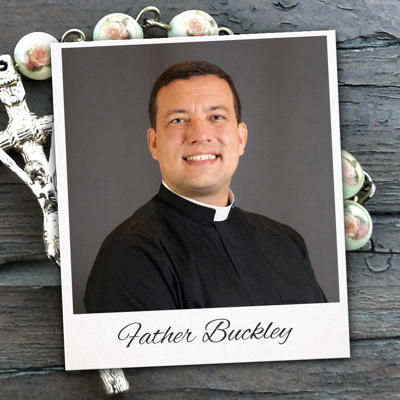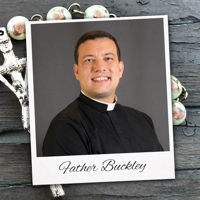
Sunday, April 27
Acts 5:12-16; Ps 118:2-4, 13-15, 22-24; Rev 1:9-11a, 12-13, 17-19; Jn 20:29; Jn 20:19-31
The disciples were fearfully locked behind doors on that first Easter Sunday when Jesus entered and said, “Peace be with you.” While Jesus’s death had dashed their hope, his gentle words, glorified wounds, and visible presence would now challenge his disciples to believe in his mercy and goodness again. Jesus enters not so much a locked room, but his disciple’s locked up fears and shame. Jesus is not afraid of their wounds and now wants them to not be afraid of his.
Fear and shame are strong feelings that are notoriously difficult to heal. Yet, the resurrected Lord comes to break all the bars of death that hold the human family captive. It takes great trust to open the doors of our heart to the grace of the resurrected Lord or to let him minister to our genuine fears.
We give thanks to God then for the clear and unfailing trust in God’s mercy that Pope Francis always modeled to the Church during his merciful 12-year pontificate. There are many quotable quotes and images of Pope Francis that demonstrate his spirituality of mercy. Perhaps, though, it is worth recalling the beginning of his spirituality of mercy. Priests are often asked to tell their vocation story. For Jorge Bergoglio that story begins and ends when he was just 17 years old. After a powerful experience of mercy in confession, a grace washed over the young Jorge, and he had an epiphany that he was called not only to be a priest but to be a priest of mercy. What is remarkable is that he never failed to follow through on this grace. Even as he struggled for his own breath at age 88, Pope Francis allowed the Lord to breathe Easter mercy into the ‘locked rooms’ of the Church.
There is no better way to honor our Holy Father than to pray for him and imitate his good example. To the extent that each of us may keep ourselves or others in "locked rooms" of fear and shame, Jesus’s Easter mission calls us to go forth into the world as missionaries of mercy. Divine Mercy Sunday is a perfect day to unlock all the doors of the church for this work.
In our gospel for the Second Sunday of Easter, after Jesus extends his peace to the disciples, he also breathes on them this new mission of forgiveness. In showing them mercy, he sends them forth as missionaries of mercy. Here then is the good work of Easter that we are called to take up this Divine Mercy Sunday: to open up the Church like a field hospital where the wounded find dignity and healing, as Pope Francis reminded us.
Like doubting Thomas, though, we all need to heal the wounds of our unbelief in God’s mercy and goodness. It is hard to believe that God loves us and forgives all our sins. It is hard to entrust all our being to God, especially at the hour of death. Pope Francis taught us in life and death to not be afraid of weak and wounded humanity, for it is this same human family that Christ comes to save. The disciple of the Lord is never ultimately afraid of anything or anyone, neither prince, nor power, nor death, nor sin, nor shame. The Lord of mercy has conquered all and with loving eyes chooses us to be missionaries of mercy in the world, just like Pope Francis.
Father Dominic J. Buckley is an assistant professor of philosophy at St. Vincent de Paul Seminary in Boynton Beach. He is priest of the Diocese of Orlando.





(0) comments
Welcome to the discussion.
Log In
Post a comment as Guest
Followers are encouraged to post questions, comments and concerns, but should remember this is a moderated online discussion hosted by Florida Catholic Media.
Florida Catholic Media appreciates healthy, constructive debate and discussion; that means comments must be kept civil in tone and reflect the charity and respect that mark Christian discourse.
Use the 'Report' link on each comment to let us know of abusive posts.